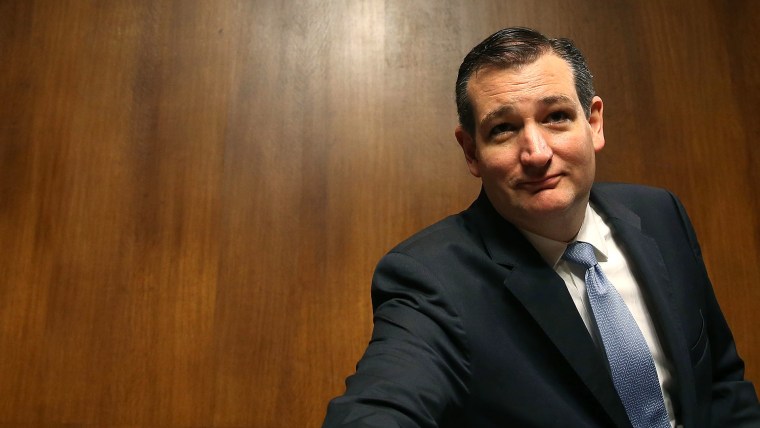There's a controversy surrounding the latest
New York Times best-sellers list, but the story isn't about which book made the rankings, but rather, which book didn't. As msnbc's Emma Margolin
reported the other day, Republican presidential hopeful Ted Cruz is making quite a fuss about being excluded.
The Texas senator and Republican presidential candidate is calling on "The Gray Lady" to apologize for leaving off his newly released memoir, "A Time for Truth: Reigniting the Promise of America," from the paper's coveted bestsellers list, or release its evidence for doing so. The action comes one day after Politico reported that The Times decided to exclude Cruz's book even though it had sold more copies in its first week -- 11,854 -- than all but two of the other bestsellers. At first, The Times told Politico it had "uniform standards," including "an analysis of book sales that goes beyond simply the number of books sold." The Cruz campaign called this explanation "cryptic" in a press release Friday.
No one outside the newspaper can explain in detail how the Times' best-seller list is compiled, but we have some general idea of the process. The newspaper has cultivated a system in which it surveys select booksellers, which are intended to represent the larger whole.
In other words, it's effectively a poll, not an election -- the paper collects representative samples, not specific national totals.
The Times also realizes that, in politics, it's pretty easy to game the system through bulk purchases. For example, if you're a senator running for president, your political operation might buy several thousand copies of your book to give away at conferences and related events. The Times' best-seller list is designed to overlook these orders -- the goal is to show which books consumers are actually buying, not just the raw totals that are easily exaggerated.
And in this case, the Times believes Cruz's book isn't flying off the shelf, so much as its sales totals are bolstered by bulk purchases. The far-right senator's publisher denies the claim and Cruz's campaign spokesperson is alleging a conspiracy of sorts, accusing the newspaper of having a "partisan bias" against the Republican senator.
So, who's right?
Part of the problem in a case like this is that it's almost impossible to say with certainty. The Times' methodology is a closely guarded secret, and the paper isn't likely to divulge proprietary details to satisfy a presidential candidate's curiosity.
But if the
New York Times manipulates its best-seller list to advance a "partisan" agenda, the paper does a horrible job of it. No More Mister Nice Blog's Steve M. raised
a very good point:
Just this year, Ann Coulter's Adios, America! reached #2 on the June 21 list. Peter Schweizer's Clinton Cash reached #2 on the May 24 list. Dana Perino's And the Good News Is... reached #2 on the May 10 list. Bill O'Reilly's Legends and Lies reached #1 on the April 26 list. Ayaan Hirsi Ali's Heretic reached #8 on the April 12 list. Mike Huckabee's God, Guns, Grits and Gravy reached #3 on the February 8 list. and Bill O'Reilly's Killing Patton was #1 on the first list of the year, dated January 4, while George W. Bush's 41 was #2 (the Bush book had hit #1 on November 30).
In other words, if the newspaper specifically made a point to exclude or downplay books written by Republicans, we probably wouldn't see quite so many Republicans with books on the New York Times best-seller list.
My suspicion is that Cruz knows this. In fact, if I had to guess, I'd say the senator doesn't really much care about making the best-seller list, so much as he cares about seeing
headlines like these: "Ted Cruz feuds with the New York Times"
The point isn't to get credit for book sales; the point is to score points with Republican primary voters who assume that any candidate who's feuding with the paper of record must be doing something right.
